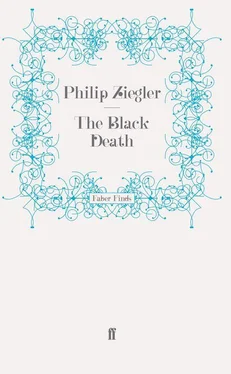Thys manere was moche y-used tofore the furste moreyn, and ys sethe somdel ychanged. For Johan Cornwall, a mayster of gramere, chayngede the lore in gramer-scole, and construccion of Freynsch into Englysch; and Richard Pencrych lurnede that manere teching of hym, and other men of Pencrych, so that now, the yere of our Lord a thousand, three hundred foure score and fyve… in all the grammer-scoles of England children leaveth Frensch and construeth and lurneth ye Englysch and habbeth thereby avauntage in on syde and desvauntage yn another. Their avauntage ys that they lurneth gramer in lesse tyme than children were i-woned to doo; desavauntage ys that now childern of gramer-scole canneth na more Frensche then can thir lift heale, and that is harme for them an they schulle passe the see and travaille in straunge landes…
Viewing the history of the English language and its literature over the last six hundred years there are few who would deny that John Cornwall, mayster of gramere, deserved well of his country. The disadvantage to which Trevisa refers still exists to trouble us but the fruits of Cornwall’s reform outweigh immeasurably the gulf which it placed between this island and mainland Europe. It would, of course, be absurd to attribute to any individual or to the Black Death itself the full responsibility for a change which had already started even before 1348 and, in the end, would inevitably have carried all before it. But it would also be a mistake to discount unduly the importance of the Black Death in removing so many of those who would have been a barrier to reform and in making it, in purely practical terms, far more difficult to carry on along the old path.
John Cornwall’s innovation was more fundamental than is suggested in Trevisa’s chronicle. For the growth of a literature in the vernacular was bound, in the end, to mean the disappearance of Latin as a medium of communication. It took an unconscionably long time a-dying; vestigial relics are, indeed, still said to linger on in England today in certain of the more antique seats of learning. But its monopoly was broken. English arose; the symbol of a new nationalism, to take its place in the law courts as the instrument for the transaction of business and for the conduct of relationships even in the most polite society. It was nationalism that dictated the use of English rather than the use of English which created nationalism, but the two fostered each other and grew side by side. Neither the growth of a national language nor of a national spirit can be said to be a uniquely English phenomenon. The sort of generalization with which we are dealing here could be applied, mutatis mutandis , to what we now mean by France, Italy or Germany. But nowhere else was the evolution so pronounced or the relevance of the Black Death so clearly marked.
‘We must not think’, wrote Dr Pantin, {483} ‘that “nationalism” was something invented at the Renaissance or even in the later middle ages… since the eleventh century there had been highly organized “national” states and deep political and racial divisions and rivalries and antipathies…’ One must not give the Black Death too much prominence in an evolution which has edged forward fitfully over many centuries, yet it would be quite as foolish to ignore its role and it is surely permissible, too, to see its by-products in the field of learning as one of the more decisive catalytic factors. In England too, it was more immediately apparent that the weakening of the international language was a blow to the universal Church. It would be a grotesque over-statement to claim that, if the English had continued to speak French and write Latin, there would have been no Reformation, but, like most over-statements, it would contain some elements of truth.
In the long run the English Universities had no cause to regret the temporary havoc which the plague caused in their workings. The shortage of clergy and lay clerks was so conspicuous that the provision of replacements became an urgent need. At Cambridge the reaction was swift. Trinity Hall, Gonville Hall and Corpus Christi were all founded as a consequence, Corpus Christi, at least, as a direct consequence of the Black Death. In the deed of 6 February 1350 by which Bishop Bateman established Trinity Hall it was specifically laid down that the purpose of the new college was to make good the appalling losses which the clergy in England and, in particular, East Anglia had suffered. The motives for founding Corpus Christi were slightly less altruistic. The members of the trade guilds found that, with the shortage of clergy after the plague, it cost them too much to have masses said for their departed members. By establishing a college they calculated that they would acquire a plentiful supply of cheap labour among the students. So deep a scar did the plague leave that even in 1441, at the foundation of King’s, the statutes, though in general terms, reiterated a reference to the need to repair the ravages of a century before. {484}
Oxford was somewhat slower off the mark. It took ten years and a second attack of the plague to induce Simon Islip, Archbishop of Canterbury, to follow Bishop Bateman’s lead. ‘…I, Simon… in view of the fact that in particular those who are truly learned and accomplished in every kind of learning have been largely exterminated in the epidemics, and that, because of the lack of opportunity, very few are coming forward at present to carry on such studies…’ heartily support a gift of money made to my ‘new college of Canterbury at Oxford.’ {485}
Similarly, a few years later, William of Wykeham, wishing to cure ‘the general disease of the clerical army, which we have observed to be grievously wounded owing to the small number of the clergy, as a result of pestilences, wars and other miseries of the world’ {486} founded New College to repair the deficiency. But New College owed more to the Black Death than the inspiration for its creation. According to tradition, backed by Thorold Rogers, {487} New College garden was the site of Oxford’s largest plague pit, an area formerly covered by houses but depopulated by the epidemic and converted to its grisly purpose. The ill wind also blew good to Merton College since the sharp drop in population allowed it to buy, at a bargain price, almost all the land between the City Wall and St Frideswides; an investment whose increasing value must have done much to solace future generations for the tribulations of their ancestors.
* * *
It would have been extraordinary if the striking changes which the Black Death had helped to evolve in the relationship between landlord and tenant had not produced perceptible results in the practice of agriculture and even the appearance of the English countryside. The crucial consequence of the epidemic was that much land fell free and that the lord not only did not wish to farm it himself but was often anxious to divest himself even of that part of the land which had formed part of his demesne before 1348. The tenements of those who died and left no heir were therefore available for distribution among those who remained. Sometimes such tenements might be taken up by immigrants who had sickened of their own, less fertile holdings and let the wilderness take over its own again. But more often the lands of the deceased were carved up among the surviving tenants of the village.
Each tenant, therefore, was likely to have a larger holding than before and, in the fluid conditions which prevailed after the plague, these could be organized into more coherent and viable blocks than had been possible under the old pattern of cultivation. The tendency was reinforced where the landlord alienated his demesne. Once a tenant was established in possession of a coherent parcel of land, then it was inevitable that he would seek to demarcate it more clearly and organize his different activities on a more workable basis. It would be wrong to speak of any dramatic and sudden switch; it took generations to transform the face of the countryside. But the hedged fields of England can plausibly be argued to have had their genesis in the aftermath of the Black Death and though such changes would, in the long run, have been inevitable, their evolution might otherwise have followed a distinct and far more protracted path.
Читать дальше












